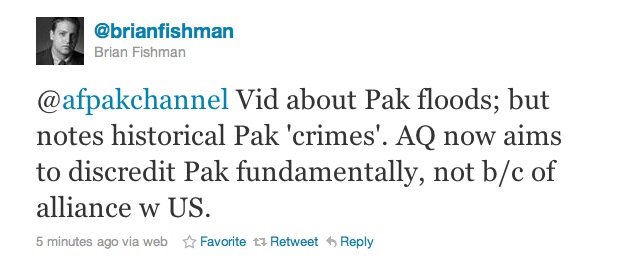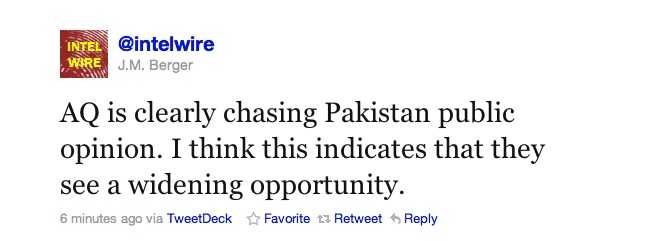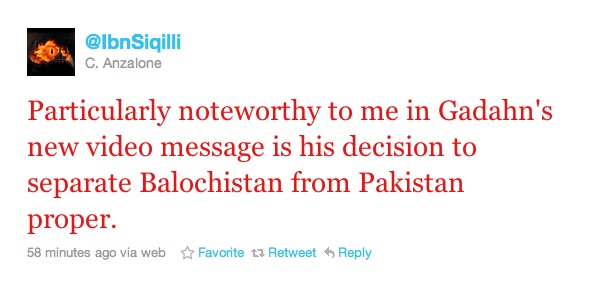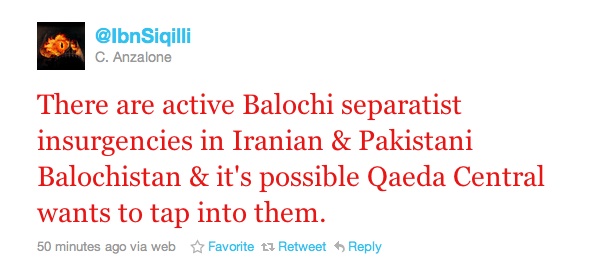UPDATE 2: Here are transcripts in English and Arabic of Gadahn’s video statement.
UPDATE: Brian Fishman, J.M. Berger, and Christopher Anzalone make perceptive points as well:




NOTE: Adam Yaḥyā Ghadan (“Azzām al-Amrīki”) was born as Adam Pearlman in California. He converted to Sunni Islam in 1995. He has been a senior operative for al-Qā’idah since 2004 and is currently in control of the As-Saḥāb (“The Clouds”) Foundation for Islamic Media Publication.
This video is boilerplate anti-American and anti-Pakistani talking points. The most interesting thing I noticed was that Gadahn was outside. Is this a message to the American’s that he is not afraid of the drone strikes or that he has more freedom of movement again? Also, I found it noteworthy that when Gadahn talked about the famous conspiracy he added an additional conspirator: “The Zionist-Crusader-Hindu Conspiracy,” which shows the importance the Kashmir cause has been taken-up within al-Qaeda as they have further embedded themselves within the Pakistani militant milieu.
—

Category: Pakistan
A Message from Russian Muslims Fighting in Waziristan
NOTE: Flashpoint Partners released a transcript of “A Message from Russian Muslims Fighting in Waziristan.” Here is a brief abstract of the transcript and below it is the entire transcript:
On August 28, 2010, a Russian-language message was posted online by Russian mujahideen fighting in Waziristan. The author of the communication complained that although he had “left kafiristan…99.99% remain under the yoke of power of the unbelievers” and that “there are many who ‘talk the talk’ but the number who actually ‘walk the walk’ can be counted on one hand.” Urging financial support from those who cannot physically wage jihad, the author writes, “Perhaps it’s difficult for the majority to give 100 rubles in the way of Allah? You say: ‘How can 100 rubles help the Jihad?’ – first, those 100 rubles help those on Judgment Day who sent them. 100 multiplied by 700 and you get 70,000 rubles. Much will be received, Insha’Allah, and with sincerity of intention. If 1000 people gather 100 rubles, that’s 100,000 rubles, and this is not a small sum. One shell for a BM1 [rocket] (Katyusha) costs $90.00. With 100,000 rubles you can buy more than thirty shells and send them flying into a US-Murtad base in Afghanistan. Who can call this insignificant?”
A Message from Russian Muslims Fighting in Waziristan
[scribd id=36738603 key=key-26u2qpm9lg8zyice2053 mode=list]
New essay from Ḥizb ut-Taḥrīr: "How would a Khilāfah in Pakistan deal with the floods?"
NOTE: Ḥizb ut-Taḥrīr (The Party of Liberation) is a Sunni pan-Islamist movement whose goal is to unite the Muslim ummah (community) and reinstate the Caliphate (al-khilāfah). Once the Caliphate is reinstated, the government would be ruled by Islamic law (sharī’ah) with the Caliph (khalīfah) being the head of state elected by a shūrā (consultation) council. Ḥizb ut-Taḥrīr was founded in 1953 in Jerusalem by Taqī ad-Dīn al-Nabhānī who was an Islamic scholar (‘ālim). Currently, Ḥizb ut-Taḥrīr is located in more than forty countries and is especially active in the United Kingdom and maintains a branch in the United States. The statement is unedited below.
—
Articles of the Week – 7/3-7/9
Sunday July 4:
Book Review of “The World for Ransom: Piracy Is Terrorism, Terrorism Is Piracy” – Daveed Gartenstein-Ross, Pragati: https://bit.ly/9xbU8r
“The Transformation of Algerian Islamist Parties” – Amel Boubekeur, The Maghreb Center Journal: https://bit.ly/bAYfIm
“Al Qaeda In Kashmir” – Eric Randolph, Current Intelligence: https://bit.ly/d2muus
Monday July 5:
“AQAP Inspire Magazine is Nothing New” – J.M. Berger, IntelWire: https://bit.ly/aWduVO
Tuesday July 6:
“Indonesia: The Dark Side of Jama’ah Ansharut Tauhid (JAT)” – International Crisis Group: https://bit.ly/aUUMun
“Un-Inspired” – Thomas Hegghammer, Jihadica: https://bit.ly/9ZB6hV
Wednesday July 7:
French Doctrine for Counterinsurgency at the Tactical Level https://bit.ly/bZcizW
“Observations of Turkish Islamist Politics: Islamic Democrats or Enemies of Turkish Secularism?” – Youssef Aboul-Enein, Small Wars Journal: https://bit.ly/9kVhj3
“Pakistan’s Competing Jihadists” – Praveen Swami, The Hindu: https://bit.ly/acCq3N
Jihadi Websites Monitoring Group, Periodical Review June 2010 – No. 2, International Institute for Counter-Terrorism: https://bit.ly/8XshP8
“Asian influence in the Middle East — friend or foe?” – Geoffrey Kemp, The Middle East Channel: https://bit.ly/dxWdra
Thursday July 8:
Salafi-Jihadis and the North Caucasus: Is There a New Phase of the War in the Making? – Murad Batal al-Shishani, Terrorism Monitor: https://bit.ly/aDHJa2
Friday July 9:
“Resistance Land- Hezbollah’s new theme park” – Andrew Table, Foreign Policy: https://bit.ly/aJpnwW
“The Legal War on Terror for the week of 7/2-7/8” – Andrew Lebovich, Foreign Policy: https://bit.ly/9J7Ssq
“The Salafists: the Latest in Islamist Politics” – François Burgat, Le Monde: https://bit.ly/d0vtLF
Interview with Marjane Satrapi, author of the graphic novel Persepolis – Foreign Policy: https://bit.ly/akEZae
Ḥizb ut-Taḥrīr in Pakistan releases new statement: "Ḥizb ut-Taḥrīr is a political party and has no connection with militancy"
NOTE: Ḥizb ut-Taḥrīr (The Party of Liberation) is a Sunni pan-Islamist movement whose goal is to unite the Muslim ummah (community) and reinstate the Caliphate (al-khilāfah). Once the Caliphate is reinstated, the government would be ruled by Islamic law (sharī’ah) with the Caliph (khalīfah) being the head of state elected by a shūrā (consultation) council. Ḥizb ut-Taḥrīr was founded in 1953 in Jerusalem by Taqī ad-Dīn al-Nabhānī who was an Islamic scholar (‘ālim). Currently, Ḥizb ut-Taḥrīr is located in more than forty countries and is especially active in the United Kingdom and maintains a branch in the United States. The statement is unedited below.
—
بِسْمِ اللّهِ الرَّحْمَنِ الرَّحِيمِ
Press Release
Date: 25th Rajab 1431 AH / 6th July 2010 CE
NO: PR10039
Hizb ut-Tahrir is a political party and has no connection with militancy
Hizb ut-Tahrir will continue its non-militant struggle to establish the Khilafah
Once again Hizb ut-Tahrir’s name is being printed in various newspapers along with other militant organizations in order to portray Hizb as a militant outfit. Furthermore failed efforts are being made to link Hizb with terrorism. In these American endeavours Punjab government is seen working hand in glove with the Federal government.
Hizb ut-Tahrir condemns these nefarious plans and evil endeavours and reiterates that such allegations will not be able to deter Hizb from its non-violent struggle for the reestablishment of the Khilafah. Hizb ut-Tahrir’s writ against its illegal banning is still pending before the High Court for the past four years. This writ is a challenge for the “independent Judiciary” of Pakistan.
The current democratically elected Punjab government is no better than the Musharraf regime which was known for its subservience to America. Rather they are completely allied to an agent like Zardari in his anit-Islamic policies carried out under the guise of fighting “terrorism”. Currently, like the Federal government, the Punjab government is also dancing on the American tune that is working day and night to eradicate Islam from this region.
After the Lahore blast, as we had forewarned the Ummah, the government immediately started its activities against the Islamic groups and Madaris (Islamic seminaries) as if she was waiting for the blast. This is the part of the strategy which the US devised for this region after 9/11.
According to the policy all those elements were to be crushed which can pose any resistance in the US hegemony of the region or secularisation of its people. Hence efforts began to alienate the Ummah from all those who loved Jihad or the Islamic parties who were working to uproot this Kufr system with non-violent means by declaring them terrorist and then to crush them.
Not only this, the curriculum of all the schools were further secularised and work began to even change the curriculum of the Madaris. After crushing those who had the ability to posed any resistance in the Tribal region, America wants to move to Punjab and the Punjab government is completely in cahoots with them.
Furthermore the rulers are trying to link Hizb with militancy because they know that it is the Hizb that exposes colonialist plans before the Ummah and has the capability to establish the Khilafah by uprooting the kufr capitalist system. This is the US plan for whose implementation US agencies are busy conducting bomb blasts in order to provide government the necessary justification for operation.
The perpetual wave of terrorism in Pakistan started with US’s arrival and will end with its departure; there is no doubt about this in the minds of the people. The government is neglecting the obligation to eject US from the region. Hence the Ummah and the people of power will have to take this responsibility upon themselves. The Ummah should undertake non-violent and political steps to stop America’s supply line passing through Pakistan. No matter if they have to block the GT Road or socially boycott the owners of the tankers to achieve this objective. America’s supply line is her lifeline, cutting which we can easily eject US from the region.
Naveed Butt
Official Spokesman of Hizb ut-Tahrir in Pakistan
New statement from Ḥizb ut-Taḥrīr in Pakistan: "By conducting blasts in Lahore America wants to initiate another operation"
NOTE: Ḥizb ut-Taḥrīr (The Party of Liberation) is a Sunni pan-Islamist movement whose goal is to unite the Muslim ummah (community) and reinstate the Caliphate (al-khilāfah). Once the Caliphate is reinstated, the government would be ruled by Islamic law (sharī’ah) with the Caliph (khalīfah) being the head of state elected by a shūrā (consultation) council. Ḥizb ut-Taḥrīr was founded in 1953 in Jerusalem by Taqī ad-Dīn al-Nabhānī who was an Islamic scholar (‘ālim). Currently, Ḥizb ut-Taḥrīr is located in more than forty countries and is especially active in the United Kingdom and maintains a branch in the United States. The statement is unedited below.
—
بِسْمِ اللّهِ الرَّحْمَنِ الرَّحِيمِ
Media Office in Pakistan
PRESS STATEMENT
NO: PR10038
Date: 21st Rajab 1431 AH / 2nd July 2010 CE
The nexus of Blackwater and the rulers, once again drenched Lahore with blood
By conducting blasts in Lahore America wants to initiate another operation
Hizb ut-Tahrir strongly condemns the bomb blasts in the Mosque adjacent to Ali Hajvairy’s (May Allah have mercy upon him) grave that killed more than 40 and injured around 200 Muslims. After a lull, America and its private army, Blackwater and DynCorp, have once again started the blood bath. The government of Punjab province just yesterday held a high-level meeting to initiate an operation against the “militants” in Punjab. The government cannot ask for a better opportunity/excuse to start this operation than a high-profile bomb blast like this. People know that it is not coincidental that Mosques, Islamic Universities, schools and market places are targeted whilst offices of Blackwater and other American terrorist organizations remain un-touched; this serves as a proof that America is behind these atrocious activities. She paves the public opinion for military operations by killing Muslims. Each time before conducting military operations for mass murder in Swat, South Waziristan and Orakzai Agency, string of bomb blasts were conducted in urban centres of Pakistan and the waves of public anger resulting from these blasts were used to support the military operations.
Let the US and their agent Muslims rulers know that the masses are no longer willing to buy this. This is why the people protested violently against the government immediately after the blast and held the government responsible for this crime. Moreover, with this terrorist act America aims at promoting sectarian hatred and wants to divide the Islamists so that they may indulge in sectarian feuds instead of uniting to kick US out of the region. This is the same policy which US adopted in Iraq.
Hizb ut-Tahrir sincerely calls the Ulema from all schools of thought that they should work together to stop US from achieving her heinous plans and call for the ejection of US from the region with a unified voice as it is solely because of American presence in the region that Pakistan has been turned into a ditch of hell. We also call upon the sincere Muslims in the people-of-power that they should reject the American order of killing their own Muslim brothers and concentrate all their efforts to rid this region from the evil presence of America. Only then this fire of fitnah can be extinguished.
Naveed Butt
Official Spokesman of Hizb ut-Tahrir in Pakistan
Articles of the Week – 6/26-7/2
Saturday June 26:
“The Muslim Past- Book Review of “Faith and Power” & “Muhammad and the Believers”” – Max Rodenbeck, The New York Times: https://nyti.ms/blRwDG
Sunday June 27:
“Endless war, a recipe for four-star arrogance” – Andrew J. Bacevich, The Washington Post: https://bit.ly/cFmDcd
Monday June 28:
“Prisons and Terrorism: Radicalisation and De-radicalisation in 15 Countries” – Peter R. Neumann, et. al, The International Centre for the Study of Radicalisation and Political Violence: https://bit.ly/9Rt4a2
“Counterinsurgency Under the Microscope” – Andrew Exum, Abu Muqawama Blog: https://bit.ly/bfzrgr
“From Sayyid Qutb To Hamas: The Middle East Conflict and Islamization of Antisemitism – Bassam Tibi, Yale University Working Paper Series: https://bit.ly/ctPYMF
Tuesday June 29:
“Abu Yahya al-Libi’s Long, Lonely Journey” – Jarret Brachman: https://bit.ly/9Hfmv9
“How Tribal Are the Taleban? Afghanistan’s Largest Insurgent Movement between its Tribal Roots and Islamist Ideology” – Thomas Ruttig, The Afghanistan Analysts Network: https://bit.ly/aR36Hl
“Estimates for Hezbollah’s Arsenal” – David Schapiro & Katherine Zimmerman, IranTracker: https://bit.ly/cWCC3S
“Islamist Radicalism in Yemen” (Updated) – Deborah Jerome, Council on Foreign Relations: https://bit.ly/aFe361
“Views of Pakistani Religious Leader Dr. Israr Ahmed (1932-2010) Regarding the Structure of an Islamic Caliphate” – The Middle East Media Research Institute: https://bit.ly/bG8mQF
“An Al-Shabaab Narco-Terrorism Connection?” – Investigative Project on Terrorism: https://bit.ly/cRXkoG
Wednesday June 30:
“The Haqqanis and al-Qaeda” – Anand Gopal, Mansur Khan Mahsud and Brian Fishman, The AfPak Channel: https://bit.ly/9NdXYM
The reason why the new al-Qaeda in the Arabian Peninsula magazine “Inspire” was corrupted & then taken down from the forums – Internet Haganah: https://bit.ly/alZhaR
“Pakistani Terror Group Lashkar-e Tayyiba Extends Tentacles in United States” – The Investigative Project on Terrorism: https://bit.ly/dtNEvn
Thursday July 1:
“Al-Qaeda in Iraq: Eliminating Leaders Will Not Necessarily Cut Lifelines” – Omar Ashour, Arab Reform Bulletin: https://bit.ly/avX3u1
“Tariq Ramadan: Exposing the Irrelevance of His Defenders in America” – Dr. Robert D. Crane, The American Muslim: https://bit.ly/aS5SZs
“Four Questions for Yemen Scholar Gregory Johnsen” – The Atlantic: https://bit.ly/a8ApNC
“Counting al-Qaeda” – Brian Fishman, The AfPak Channel: https://bit.ly/aYVvqN
“Top Twenty Plots to Know since 9/11” – The Center on Law and Security: https://bit.ly/9QfVz2
Friday July 2:
“Ruminations on the AQAP magazine and its ridiculous coverage” – J.M. Berger, IntelWire: https://bit.ly/akv4Rz
“Hiding In Plain Sight- Terrorists in Punjab Province” – Ahmad Majidyar, Foreign Policy: https://bit.ly/9lW9f6
Articles of the Week – 6/19-6/25
Sunday June 20:
“Legitimate Demands [2] Barack’s Dilemma” – Adam Gadahan, As-Saḥāb Foundation for Islamic Media Publication: https://bit.ly/c6dQXK
“Forget the substance of Gadahn’s post, it’s the tech that matters” – J.M. Berger, IntelWire: https://bit.ly/dty6tR
“Good Deal for Gaza” – Marc Lynch, The Middle East Channel: https://bit.ly/blRn8x
Monday June 21:
“Kandahar Timeline 1979-2010” – Alex Strick van Linschoten, A Different Place Blog: https://bit.ly/aM0bld
“The 2010 Failed State Index Rankings” – Foreign Policy Magazine, July/August 2010: https://bit.ly/9kutY3
“State of Jihad: 2010 and Beyond” – Matthew M. Reed, International Affairs Review: https://bit.ly/cYX4w4
“Politics and prayer”- Review of “A Mosque in Munich” – Issandr El Amrani, The National: https://bit.ly/95mbax
Jihadi Websites Monitoring Group, Periodical Review June 2010 – No. 1, International Institute for Counter-Terrorism: https://bit.ly/ab2WDN
“Profiles of the 15 known Saudi Guantanamo recidivists” – Thomas Joscelyn, The Long War Journal: https://bit.ly/bL1CEw
“A New Taleban Front?” – Thomas Ruttig, The Afghanistan Analysts Network: https://bit.ly/aexJjQ
Tuesday June 22:
“Yemen: Avoiding Freefall” – Ginny Hill, The World Today, Volume 66, Number 7, July 2010: https://bit.ly/aA7kln
“West Africa and the Maghreb Security Brief June 7, 2010 – June 22, 2010” – Critical Threats Project: https://bit.ly/cHdVL7
“Punjab’s growing militant problem” – Interview with Hassan Abbas, The AfPak Channel: https://bit.ly/c9Rvm4
“West coast jihad” – Brian Fishman, The AfPak Channel: https://bit.ly/dzmznm
Wednesday June 23:
“Militant’s Path From Pakistan to Times Square” – Andrea Elliott, New York Times: https://nyti.ms/b1ZJEX
“Veiled Truths- The Rise of Political Islam in the West” – Marc Lynch, Foreign Affairs: https://bit.ly/caa3UL
Thursday June 24:
“The Iraqi Elections of 2010—and 2005” – Kanan Makiya, The Crown Center for Middle East Studies, Middle East Brief 42, June 2010: https://bit.ly/9OfrOA
“Puncturing Pakistan’s “madrasa myth”” – Gregg Carlstrom, The Majlis: https://bit.ly/9vNjZR
Friday June 25:
“Saudi Preacher: The West Implements the Humane Values of the Shari’a Better than the Muslims” – Middle East Media Research Institute: https://bit.ly/9KHXNj
“The Legal War on Terror for the week of 6/18-6/24” – Andrew Lebovich, Foreign Policy: https://bit.ly/cI0a7I
“Al-Qaeda losing supporters in jihadi groups across Arab world” – Camille Tawil, Magharebia: https://bit.ly/bZw7yr
“Islamist Preacher Zakir Naik, Barred from U.K. and Canada – An Ideological Profile” – Steven Stalinsky, Middle East Media Research Institute: https://bit.ly/cXSiR4
‘Scratching the Surface of Radicalism in Germany” – Andrew Lebovich, The Washington Note: https://bit.ly/9ZsTHm
Best Articles of the Past Week – 6/12-6/18
Sunday June 13:
“Lashkar-i-Taiba: Roots, Logistics, Partnerships, and the Fallacy of Subservient Proxies” – Ryan Clarke, Terrorism and Political Violence, Volume 22 Issue 3, July 2010, 395-418: https://www.informaworld.com/smpp/content~db=all~content=a922884886~frm=titlelink
Monday June 14:
“Jihad Is Not the Medicine for Every Disease” – Mark Stout, On War and Words: https://onwarandwords.wordpress.com/2010/06/14/jihad-is-not-the-medicine-for-every-disease/
“AfPak Behind the Lines: Taliban reconciliation” – Interview with Thomas Ruttig, The AfPak Channel: https://afpak.foreignpolicy.com/posts/2010/06/14/afpak_behind_the_lines_thomas_ruttig
“Barack Obama face au spectre Al-Qaida” – Jean-Pierre Filiu, Le Monde: https://www.lemonde.fr/idees/article/2010/06/14/barack-obama-face-au-spectre-al-qaida_1372437_3232.html
Tuesday June 15:
“Catherine Zara Raymond — Al Muhajiroun and Islam4UK- The group behind the ban” – Catherine Zara Raymond, The International Centre for the Study of Radicalisation and Political Violence, May 2010: https://icsr.info/publications/papers/1276697989CatherineZaraRaymondICSRPaper.pdf
Wednesday June 16:
“Afghanistan: Graveyard of Assumptions?” – Andrew Exum, Abu Muqawama Blog: https://www.cnas.org/blogs/abumuqawama/2010/06/afghanistan-graveyard-assumptions.html
Thursday June 17:
“World Cup Fatwa” – Mathilde Aarseth, Jihadica: https://www.jihadica.com/world-cup-fatwa/
“Coddling Pakistan’s Islamists” – Rania Abouzeid, The AfPak Channel: https://afpak.foreignpolicy.com/posts/2010/06/17/coddling_pakistans_islamists
“The Hollow Arab Core” – Marc Lynch, The Middle East Channel: https://mideast.foreignpolicy.com/posts/2010/06/17/the_hollow_arab_core
“Terrorists Versus Soccer” – Adam Serwer, The American Prospect: https://www.prospect.org/cs/articles?article=terrorists_v_soccer
“English Translation of Abū Walīd’s Response to Charles Cameron” – al-Maktabah Blog: https://azelin.wordpress.com/2010/06/17/english-translation-of-abu-walids-response-to-charles-cameron/
“The Legal War on Terror for the week of 6/11-6/17” – Andrew Lebovich, Foreign Policy: https://www.foreignpolicy.com/articles/2010/06/17/the_lwot_grand_jury_returns_shahzad_indictment_supreme_court_rejects_rendition_lawsuit
“Pak intelligence pulls Taliban strings: New report gives an inside view of our ally’s double game” – Daveed Gartenstein-Ross, The Washington Times: https://www.washingtontimes.com/news/2010/jun/17/pak-intelligence-pulls-taliban-strings/
Friday June 18:
“Could the Taliban Take Over Pakistan’s Punjab Province?” – Ahmad Majidyar, The American Enterprise Institute: https://www.aei.org/docLib/02-MEO-June-2010-g.pdf
Best Articles of the Past Week – 6/5-6/11
Saturday June 5:
“Abu Walid al Masri responds to Charles Cameron” – Leah Farrall, All Things Counter Terrorism: https://allthingsct.wordpress.com/2010/06/05/abu-walid-al-masri-responds-to-charles-cameron/
“Rhetoric and Reality: Countering Terrorism in the Age of Obama” – Marc Lynch, Center for a New American Security: https://www.cnas.org/files/documents/publications/CNAS_Rhetoric%20and%20Reality_Lynch.pdf
Monday June 7:
“Does al Qaeda Threaten the World Cup? Assessment, Context, and Implications for Understanding of the al Qaeda Network” – Charlie Szrom, Critical Threats Project: https://www.criticalthreats.org/africa/does-al-qaeda-threaten-world-cup-assessment-context-june-7-2010
Tuesday June 8:
“Exploiting Grievances: Al-Qaeda in the Arabian Peninsula” – Alistair Harris, Carnegie Endowment for International Peace: https://www.carnegieendowment.org/files/exploiting_grievances.pdf
“Counterterrorism and democracy promotion in the Sahel under Presidents George W. Bush and Barack Obama from September 11, 2001, to the Nigerien Coup of February 2010” – Alex Thurston, Association of Concerned Africa Scholars, ACAS Bulletin No. 85: https://concernedafricascholars.org/docs/bulletin85thurston.pdf
“From GSPC to AQIM: The evolution of an Algerian islamist terrorist group into an Al-Qa‘ida Affiliate and its implications for the Sahara-Sahel region” – Stephen Harmon, Association of Concerned Africa Scholars, ACAS Bulletin No. 85: https://concernedafricascholars.org/docs/bulletin85harmon.pdf
Wednesday June 9:
“Militants Seize Mecca” – Marissa Allison, al-Maktabah Blog: https://azelin.wordpress.com/2010/06/09/guest-post-juhayman-al-utaybi-and-the-siege-of-the-grand-mosque-in-mecca/
Thursday June 10:
“Could Al-Qaeda Turn African in the Sahel?” – Jean-Pierre Filiu, Carnegie Endowment for International Peace, Carnegie Papers No. 112: https://www.carnegieendowment.org/files/al_qaeda_sahel.pdf
“Jihād & the Battle of Uncertainty” – Abū Yaḥyā al-Lībī, Al-Fajr Media Center: https://jihadology.net/wp-content/uploads/_pda/2010/06/al-fajr-media-center-presents-a-new-book-by-abu-yahya-al-libi-jihad-the-battle-of-uncertainty.pdf
“Pakistan’s New Networks of Terror” – Imtiaz Gul, Foreign Policy: https://www.foreignpolicy.com/articles/2010/06/10/pakistans_new_networks_of_terror
Friday June 11:
“Muddying the ‘Taliban'” – Brian Fishman, The AfPak Channel: https://afpak.foreignpolicy.com/posts/2010/06/11/muddying_the_taliban
